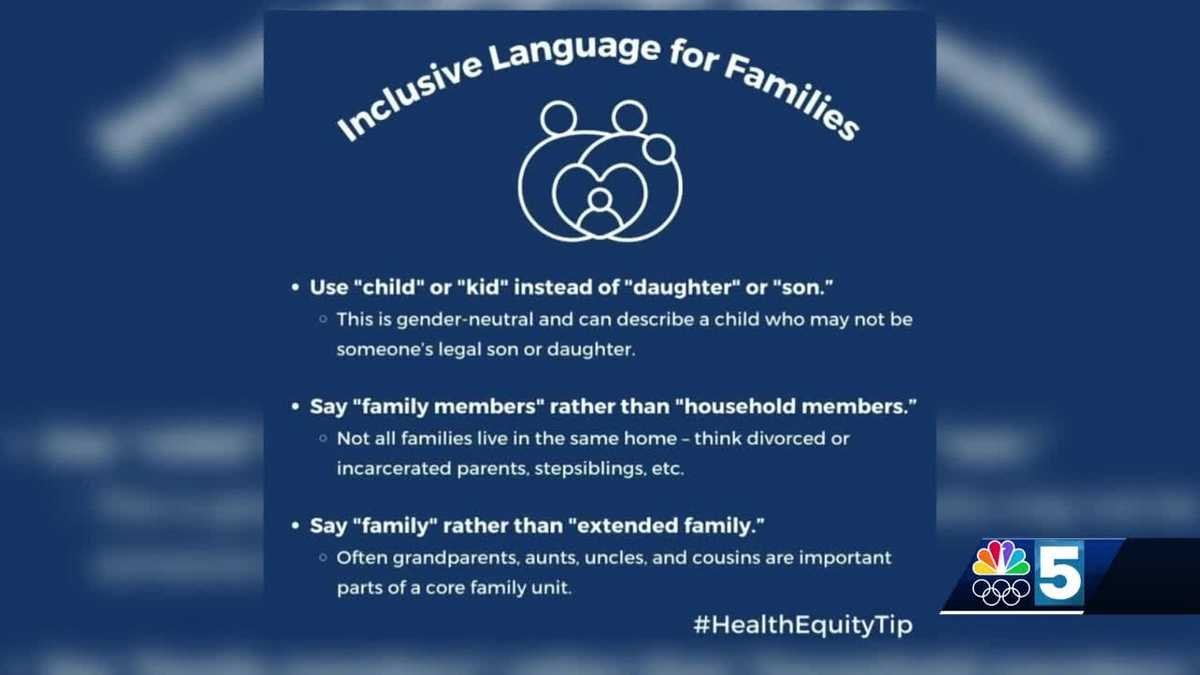Middle school, community member react to Vermont Department of Health’s inclusive language tips


As a new school year is underway, the Vermont Department of Health is encouraging educators to be mindful of the language they use when talking about students’ family situations.The state wants inclusive language to be prioritized because it says you never know someone’s family structure. Last week, the Department of Health put out this post sharing some tips. “We all live in different family settings,” said Sara Chesbrough, Vermont Department of Health’s equity team lead within the Family and Child Health division. “We don’t all use the same terms to refer to one another. And so our post was encouraging Vermonters as kids head back to school to just use language that affirms and validates all family structures.”Crossett Brook Middle School co-principal Jennifer Durren said they plan to implement some of this advice in their classrooms.The former teacher emphasized the need to put equity at the forefront in schools.“I remember addressing my class as ‘ladies and gentlemen’ because, at the time, my principal told me how respectful that was of my students,” said Durren. “Thinking back on that now, I realized just how kind of antiquated that is and really not thinking about how our kids are.”Durren said inclusive language is important to value.“We really have to think about how we communicate with caregivers and with students in a way that is neutral to their own personal experiences,” said Durren.However, others feel the post is excessive. Eric Sullivan, who currently lives in Connecticut but still has family in Vermont, can relate to the second tip about saying “family members” instead of “household members” since his parents are divorced.That being said, he still feels the change isn’t necessary.“If I failed the test or got in trouble or needed a signature from my parents like, ‘Hey, make sure when you get home, show this to Mom and Dad.’ I knew when I got home I may not see Mom, or I may not see Dad, and that’s okay. That didn’t bother me,” said Sullivan.Sullivan and his fiancee want to start a family soon.He said posts like what the Department of Health shared make him seriously consider homeschooling when that time comes. “Are you there to educate, or are you there to coddle?” said Sullivan.Chesbrough said the department will keep highlighting that inclusive language matters.She said equity in the classroom is an essential piece to creating a productive and healthy learning environment.“We’re going to keep kind of unapologetically using gender neutral, gender-affirming and just broadly inclusive language to refer to parents, kids and families,” said Chesbrough. “We’re trying to be part of this change and language people use to refer to each other.”If interested in learning more about inclusive communication practices, here are some health department-approved resources.Health Equity Guiding Principles for Inclusive Communication | Gateway to Health Communication | CDCClinical: Words Matter: The Power of Inclusive Language in Medicine (osmosis.org)School Connectedness Helps Students Thrive | DASH | CDCWhat Can Schools Do? | DASH | CDC
DUXBURY, Vt. —
As a new school year is underway, the Vermont Department of Health is encouraging educators to be mindful of the language they use when talking about students’ family situations.
The state wants inclusive language to be prioritized because it says you never know someone’s family structure.
Last week, the Department of Health put out this post sharing some tips.

“We all live in different family settings,” said Sara Chesbrough, Vermont Department of Health’s equity team lead within the Family and Child Health division. “We don’t all use the same terms to refer to one another. And so our post was encouraging Vermonters as kids head back to school to just use language that affirms and validates all family structures.”
Crossett Brook Middle School co-principal Jennifer Durren said they plan to implement some of this advice in their classrooms.
The former teacher emphasized the need to put equity at the forefront in schools.
“I remember addressing my class as ‘ladies and gentlemen’ because, at the time, my principal told me how respectful that was of my students,” said Durren. “Thinking back on that now, I realized just how kind of antiquated that is and really not thinking about how our kids are.”
Durren said inclusive language is important to value.
“We really have to think about how we communicate with caregivers and with students in a way that is neutral to their own personal experiences,” said Durren.
However, others feel the post is excessive.
Eric Sullivan, who currently lives in Connecticut but still has family in Vermont, can relate to the second tip about saying “family members” instead of “household members” since his parents are divorced.
That being said, he still feels the change isn’t necessary.
“If I failed the test or got in trouble or needed a signature from my parents like, ‘Hey, make sure when you get home, show this to Mom and Dad.’ I knew when I got home I may not see Mom, or I may not see Dad, and that’s okay. That didn’t bother me,” said Sullivan.
Sullivan and his fiancee want to start a family soon.
He said posts like what the Department of Health shared make him seriously consider homeschooling when that time comes.
“Are you there to educate, or are you there to coddle?” said Sullivan.
Chesbrough said the department will keep highlighting that inclusive language matters.
She said equity in the classroom is an essential piece to creating a productive and healthy learning environment.
“We’re going to keep kind of unapologetically using gender neutral, gender-affirming and just broadly inclusive language to refer to parents, kids and families,” said Chesbrough. “We’re trying to be part of this change and language people use to refer to each other.”
If interested in learning more about inclusive communication practices, here are some health department-approved resources.
Health Equity Guiding Principles for Inclusive Communication | Gateway to Health Communication | CDC
Clinical: Words Matter: The Power of Inclusive Language in Medicine (osmosis.org)
School Connectedness Helps Students Thrive | DASH | CDC
What Can Schools Do? | DASH | CDC





